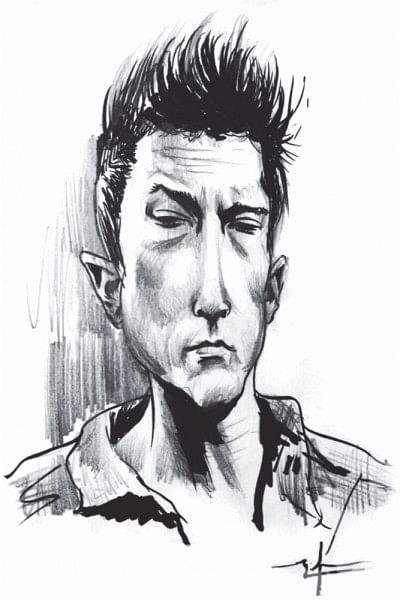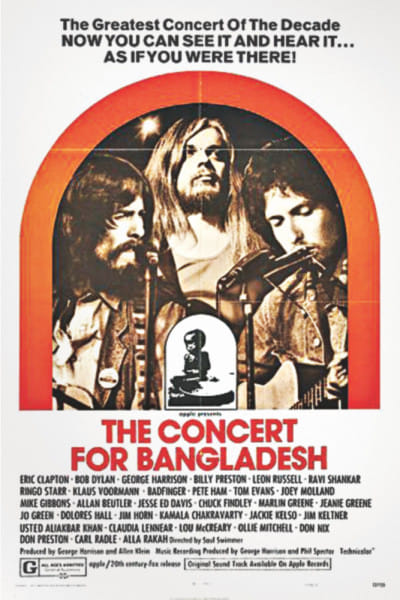The Times Are a Changing

In the 1970, the world was shocked with news of the famous band, the Beatles, breaking up. The following year, while John Lennon and Paul McCartney were busy trading insults in the press, the quiet Beatle, George Harrison, was set out to make rock and roll history. To come to the aid of the 1971 refugee crisis of Bangladesh, Harrison and Ravi Shankar together pulled off two of the biggest aid concerts in history, named Concert for Bangladesh. The concert was a massive success as thousands of people showed up at New York's Madison Square Garden as both shows were successfully sold out. Of course it was a big deal for the Americans to see a Beatle perform, but Harrison was not the only show stopper. Being in a hiatus for two years, Bob Dylan made his come back performance in this very concert. As Dylan opened with his song 'Blowing in the Wind'; Bangladesh was introduced to the 'Man of Constant Sorrow'.
The Concert for Bangladesh was one of the first aid concerts ever held. This was the cause that showcased rock and roll's responsibility towards humanity, and of course it would not be complete without Dylan. The 70's represented the peak of the peace and anti-war movement. As the American youth grew tired of war and hatred, slogans such as 'Give Peace a Chance' grew stronger. Concert for Bangladesh in a way demanded Dylan's presence. It is said that Harrison himself wasn't sure of Dylan's appearance as he didn't perform a single song in two years. Until the middle of a song switch when Harrison saw Dylan backstage standing with his guitar, Bob Dylan was a question mark in the set list.

Now what was it that made Dylan a front man for these movements? Before we go into detail, we must look at the legacy which is Bob Dylan. From the early 60's till today, decade after decade, Bob Dylan has filled our heads with a language that both illuminates and transforms the realities we confront. A radical poet who wanted to be free from the shackles and baggages of bad traditions, we are talking about a person who, half a century ago, shocked the music world by plugging in an electric guitar and alienating folk purists. Dylan's cultural impact, while difficult to narrow down, started from New York's Greenwich Village. Dylan and his compatriots such as Pete Seeger and John Baez relegated to small coffee shops as they found the support for their avant-garde personalities there. Ironically, Dylan challenged the washed up traditions by digging out American traditions of music. He used traditional music such as blues and country to speak about the counter cultural movement.
Every one of his songs had a statement challenging the wrongdoings that were taking place around him. For example "How many deaths will it take till they know / that too many people have died?”— brought up echoes of countless deaths in the name of freedom, and has been something of a battle cry for Dylan's listeners. “People like Dylan established that one cannot be an artist just by sitting with a guitar,” says Probar Ripon, poet, singer and vocals for the band Monosoroni. “He somewhat showed that there are responsibilities of being an artist and that it's not just about the glamour and the fame.” There is also ferocity and magic of "Desolation Row," where he suggests to Eliot and Pound for "fighting in the captain's tower." We can sense that Dylan's presence with the captains, struggling to express the fear and loneliness that oppresses us all. This song is also an example of Dylan's mixing of a range of sources in his lyrics— from fairy tales to science, from the Bible to Shakespear. It is hard to find examples of a singer who sang about conflict and at the same time rose up to billboard charts, much like a pop star. The great actor Jack Nicholson had summed up Dylan's work and popularity quite neatly. After Dylan got his first Grammy, the actor said, "Bob Dylan brought intellect into our pop music.”
On October 13, 2016, Bob Dylan, the poet leader of the rock era was awarded the Nobel Prize for Literature. Credited with having "created new poetic expressions within the great American song tradition," Dylan, 75, became the 259th American to have won a Nobel Prize. While this announcement was made and the world celebrated the first rock star noble laureate, the quiet Bob Dylan remained so, not giving any statement on the topic. Nonetheless tweets and Facebook statuses kept rolling in, both praising and criticising the discussion. Prominent writers celebrated Dylan's literary achievements, including Stephen King, Joyce Carol Oates and Salman Rushdie, who called Mr. Dylan “the brilliant inheritor of the bardic tradition,” and also adding that it was a 'great choice'. This is the first time a singer has won this prestigious prize, and also the second lyricist after Tagore. “This is a stepping stone for literature as well, for it gave songwriting a much awaited place in the world of literature,” says Sharmin Chowdhury, Associate Professor at Department of English, New York University. “For example we can see great writers such as Homer and Sappho. They wrote poetic texts which were meant to be performed, and it's the same for Bob Dylan.”
Bob Dylan is said to be a very quiet and introverted fellow. His songs consist of all that he has to say. Though the Nobel Prize was a very big achievement, Bob Dylan cannot be labeled as just a Nobel Laureate. He is beyond the awards he won. As Leonard Cohen said, “It is like pinning a medal on Mount Everest for being the tallest mountain.” We salute the poet for his outstanding gift of poetry to the humanity. His words will forever be “Blowing in the Wind”.

 For all latest news, follow The Daily Star's Google News channel.
For all latest news, follow The Daily Star's Google News channel. 



Comments